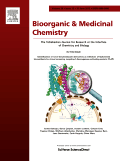
BIOORGANIC & MEDICINAL CHEMISTRY
Scope & Guideline
Transforming Therapeutics with Cutting-Edge Chemistry
Introduction
Aims and Scopes
- Medicinal Chemistry:
Research devoted to the design and synthesis of new pharmaceutical agents, exploring their mechanisms of action and therapeutic potential. - Bioorganic Chemistry:
Studies on the chemical processes within and related to living organisms, including the synthesis of biomolecules and their interactions. - Pharmacology and Drug Development:
Investigations into the pharmacokinetics, pharmacodynamics, and therapeutic efficacy of newly developed compounds in various disease models. - Chemical Biology:
Research that bridges chemistry and biology, focusing on the development of chemical tools to study biological systems. - Natural Products Chemistry:
Exploration and modification of natural products to develop new therapeutic agents, including their structure-activity relationships. - Bioconjugation and Drug Delivery Systems:
Innovative strategies for enhancing drug delivery and targeting, including the use of conjugates and prodrugs.
Trending and Emerging
- PROTACs and Targeted Protein Degradation:
The increasing interest in PROTACs (Proteolysis Targeting Chimeras) highlights a shift towards innovative strategies for targeted protein degradation, offering new avenues for therapeutic intervention. - Immuno-oncology and Cancer Immunotherapy:
Research on compounds that modulate immune responses to enhance anti-tumor activity is gaining momentum, reflecting the growing importance of immunotherapy in cancer treatment. - RNA-targeted Therapeutics:
With advancements in RNA biology, there is a rising focus on developing small molecules that target RNA structures, potentially leading to novel therapeutic agents. - Nanotechnology in Drug Delivery:
The integration of nanotechnology for drug delivery systems is increasingly prominent, focusing on improving bioavailability and targeting specific tissues. - Natural Product Derivatives:
There is renewed interest in modifying natural products to enhance their therapeutic properties, leveraging their complex structures and biological activity. - Synthetic Biology Applications:
Emerging research is increasingly focusing on the application of synthetic biology techniques for drug discovery and development, showcasing the interdisciplinary nature of modern medicinal chemistry.
Declining or Waning
- Traditional Antibiotic Development:
Research in this area has decreased as focus shifts toward novel mechanisms of action and alternative therapeutic strategies to combat antibiotic resistance. - Basic Organic Synthesis:
Publications solely focused on the synthetic methodologies without direct application to biological systems are becoming less frequent as interdisciplinary approaches gain traction. - Single-target Drug Discovery:
The trend is moving towards multi-target approaches or combination therapies, leading to a reduction in publications centered on single-target compounds. - In Vitro Studies without In Vivo Correlation:
There is a waning interest in studies that do not extend beyond in vitro evaluations, as there is a growing emphasis on translational research that includes in vivo studies.
Similar Journals
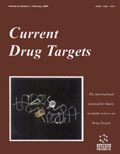
CURRENT DRUG TARGETS
Pioneering Discoveries in Drug DevelopmentCURRENT DRUG TARGETS is a leading peer-reviewed journal dedicated to advancements in the fields of Clinical Biochemistry, Drug Discovery, Molecular Medicine, and Pharmacology. Published by Bentham Science Publishers Ltd, this esteemed journal has solidified its position in the academic community with a 2023 Q2 ranking in several categories, highlighting its influence and relevance in drug research and development. With an ISSN of 1389-4501 and E-ISSN 1873-5592, CURRENT DRUG TARGETS facilitates the dissemination of high-quality articles that explore novel therapeutic strategies and drug design principles. Catered to researchers, professionals, and students, the journal has a commitment to advancing knowledge while addressing contemporary challenges in pharmacological sciences. As it converges from 2000 to 2024, CURRENT DRUG TARGETS remains a vital resource in understanding the complexities of drug action and interaction, making it indispensable for anyone pursuing cutting-edge research in related disciplines.
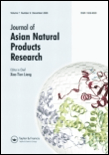
JOURNAL OF ASIAN NATURAL PRODUCTS RESEARCH
Cultivating Insights in Complementary MedicineJOURNAL OF ASIAN NATURAL PRODUCTS RESEARCH is a prestigious publication in the field of natural products, focusing on valuable research spanning analytical chemistry, pharmacology, and complementary medicine. Published by Taylor & Francis Ltd in the United Kingdom, this journal has established itself as a key resource for academics and professionals seeking to explore advancements in drug discovery and organic chemistry. With a converged publication timeline from 1998 to 2024, the journal boasts several commendable category quartiles as of 2023, reflecting its robust standing in the research community: Q2 in Complementary and Alternative Medicine, Q3 in multiple domains including Analytical Chemistry and Organic Chemistry, and Q4 in Molecular Medicine. Although it currently does not offer open access, the journal remains a valuable compendium for empirical research and innovative studies in areas such as pharmacology and medicinal chemistry. Researchers, professionals, and students alike will find the JOURNAL OF ASIAN NATURAL PRODUCTS RESEARCH to be an essential platform for sharing groundbreaking findings and fostering collaborations that lead to significant advancements in science and health.
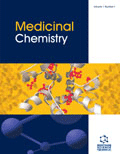
Medicinal Chemistry
Advancing drug discovery through cutting-edge research.Medicinal Chemistry is a prestigious journal published by Bentham Science Publishers Ltd, dedicated to advancing the field of drug discovery and development. Established in 2005 with a converged publication timeframe extending to 2024, this journal serves as a vital resource for researchers and professionals interested in the intricate processes of medicinal chemistry, pharmacology, and toxicology. With an ISSN of 1573-4064 and an E-ISSN of 1875-6638, it has established a notable presence in the academic community, currently positioned in Q3 of Drug Discovery category according to the 2023 quartiles. The journal's ranking in Scopus places it at 90 out of 157 in its field, showcasing its impact and relevance, with a percentile standing of 42. Although the journal is not open access, it continues to provide insightful articles and research findings that contribute significantly to the understanding and innovation in medicinal chemistry. Based in the United Arab Emirates, Medicinal Chemistry is committed to disseminating high-quality research that shapes the future of drug formulation and therapeutic advancement.
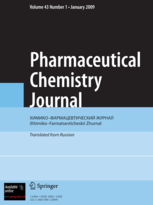
PHARMACEUTICAL CHEMISTRY JOURNAL
Exploring New Frontiers in Pharmaceutical Chemistry.Pharmaceutical Chemistry Journal is a pivotal publication in the field of pharmaceutical sciences, renowned for its in-depth articles and research findings. Published by Springer in the United States, this journal provides a crucial platform for researchers, students, and professionals dedicated to advancing drug discovery and pharmacology. With an ISSN of 0091-150X and an E-ISSN of 1573-9031, this journal has consistently aimed to promote scholarly communication and innovation within its scope since its inception in 1967. Despite its current Category Quartiles ranking of Q4 in both Drug Discovery and Pharmacology, the journal remains a valuable resource for disseminating new ideas and findings that contribute to the scientific community. Researchers benefit from the journal's commitment to high-quality peer-reviewed content, even in an environment where open access options are currently not available. As the field evolves, the Pharmaceutical Chemistry Journal continues to play an important role in shaping future advancements in drug development and safety.
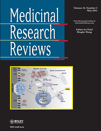
MEDICINAL RESEARCH REVIEWS
Pioneering Reviews that Shape the Future of MedicineMEDICINAL RESEARCH REVIEWS, published by Wiley, is a leading journal in the fields of Drug Discovery, Molecular Medicine, and Pharmacology. With an impressive impact factor and esteemed standing in its category quartiles (Q1 in all three fields), this journal serves as a vital platform for the dissemination of cutting-edge research and reviews that drive innovation in therapeutic development and molecular health sciences. Since its inception in 1981, MEDICINAL RESEARCH REVIEWS has garnered a robust readership within the scientific community, underscored by its high rankings in Scopus – where it ranks #3 in Pharmacology and #2 in Drug Discovery, placing it within the top echelons of academic influence. Researchers, professionals, and students alike benefit from its rich content and comprehensive approaches to tackling complex medicinal challenges, making it an essential resource for those invested in advancing the frontiers of biomedical research.
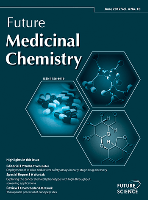
Future Medicinal Chemistry
Transforming challenges into opportunities in drug development.Future Medicinal Chemistry is a premier journal dedicated to the rapidly evolving fields of drug discovery, pharmacology, and molecular medicine. Published by Newlands Press Ltd in the United Kingdom, this journal has garnered significant attention within the academic community, evidenced by its 2023 category rankings in Scopus, placing it in the Q2 quartile for Drug Discovery and the Q3 quartiles for both Molecular Medicine and Pharmacology. With an ISSN of 1756-8919 and an E-ISSN of 1756-8927, Future Medicinal Chemistry has been a cornerstone of scholarly discourse since its inception in 2009, continuously contributing to the advancement of knowledge and discussion in medicinal chemistry. The journal is committed to publishing high-quality, peer-reviewed research that addresses the challenges and innovations in drug development and therapeutic strategies, making it an essential resource for researchers, professionals, and students seeking to stay at the forefront of these critical fields. Engage with the latest findings and methodologies that shape the future of medicine by exploring the wealth of information offered within Future Medicinal Chemistry.
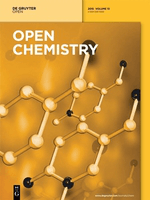
Open Chemistry
Catalyzing Progress in Chemistry and Materials ScienceOpen Chemistry, published by DE GRUYTER POLAND SP Z O O, is a distinguished peer-reviewed journal that has been serving the global chemistry community since its inception. With an ISSN of 2391-5420 and an E-ISSN also of 2391-5420, this open-access journal has been accessible to researchers and practitioners alike since 2015, ensuring a wide dissemination of high-quality research findings. Located in Germany, specifically at BOGUMILA ZUGA 32A STR, 01-811 WARSAW, MAZOVIA, POLAND, Open Chemistry aims to publish innovative research across various chemical disciplines, with special attention to miscellaneous chemistry and materials chemistry. It is currently ranked in the Q3 category for both fields as of 2023, reflecting its solid standing within the academic community, with specific ranks of 187/408 in General Chemistry and 153/317 in Materials Chemistry, corresponding to respective percentiles of 54 and 51. Open Chemistry not only enhances the accessibility of cutting-edge research but also serves as a vital resource for students, professionals, and scholars seeking to advance their knowledge in the rapidly evolving landscape of chemical sciences.
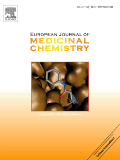
EUROPEAN JOURNAL OF MEDICINAL CHEMISTRY
Pioneering Insights for the Future of Pharmacology.European Journal of Medicinal Chemistry, a premier publication by Elsevier France-Editions Scientifiques Médicales Elsevier, has been at the forefront of advancing medicinal chemistry since its inception in 1974. With an impressive impact factor and ranking in the Q1 quartile across multiple categories including Drug Discovery, Medicine (miscellaneous), Organic Chemistry, and Pharmacology, this journal delivers cutting-edge research and reviews that are vital for researchers and professionals in the field. The journal’s scope encompasses the design, synthesis, and evaluation of biological activity of bioactive compounds, making it a critical resource for those looking to innovate in drug development and therapeutic strategies. Although currently not open access, subscribers can benefit from its diverse range of high-quality articles, ensuring the dissemination of knowledge in the ever-evolving landscape of medicinal chemistry. The European Journal of Medicinal Chemistry continues to play a pivotal role in shaping the future of pharmacological research and its application, thus appealing to an audience dedicated to making impactful scientific contributions.

RUSSIAN JOURNAL OF BIOORGANIC CHEMISTRY
Innovating Through Biomolecular InsightsRussian Journal of Bioorganic Chemistry (ISSN: 1068-1620, E-ISSN: 1608-330X), published by MAIK Nauka/Interperiodica/Springer, serves as a vital resource for researchers and professionals in the fields of bioorganic chemistry, biochemistry, and organic chemistry. With a focus on the integration of organic chemistry principles with biological processes, this journal aims to disseminate significant findings and advancements from both theoretical and practical perspectives. Although currently not open access, the journal retains a dedication to high-quality, peer-reviewed content, contributing to its reputation within the academic community. The 2023 Scopus rankings position it within the Q4 category for both biochemistry and organic chemistry, indicating its critical niche within these disciplines amid a competitive landscape. Since its inception in 1996, the journal has continued to evolve, providing enriching insights and fostering collaborations among scholars and practitioners alike, with publication converging up to the year 2024. By exploring complex biomolecular interactions and the synthesis of biologically relevant compounds, the Russian Journal of Bioorganic Chemistry remains a significant platform for advancing knowledge and innovation in the life sciences.
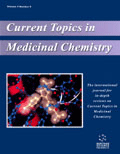
CURRENT TOPICS IN MEDICINAL CHEMISTRY
Exploring Breakthroughs in Therapeutic StrategiesCURRENT TOPICS IN MEDICINAL CHEMISTRY is a prestigious journal published by Bentham Science Publishers Ltd, dedicated to advancing the field of medicinal chemistry through the dissemination of high-quality research from 2001 to 2024. With an ISSN of 1568-0266 and an E-ISSN of 1873-4294, this journal is recognized for its significant contributions, as evidenced by its Scopus ranking in the 63rd percentile in the category of Drug Discovery, specifically at position #58 out of 157. Currently placed in Quartile 3 within Drug Discovery and Quartile 2 in miscellaneous medicine as of 2023, it serves as an essential resource for researchers, professionals, and students interested in the latest developments, methodologies, and applications in medicinal chemistry. The journal aims to foster collaboration and innovation by featuring original research articles, reviews, and brief communications that address current and emerging challenges in the discipline. Although it is not an open access platform, the journal's rich content is indispensable for those striving to enhance therapeutic strategies and drug development processes.